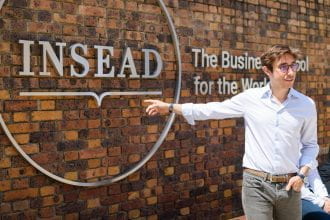It seems like only yesterday that I was surrounded by 15Js raising glasses of champagne while drenched in perspiration in our formal suits and dresses (the heat wave in Europe had a role to play). We were fearless, ready to go out and be leaders in the world. My career path pre-INSEAD is familiar to many — I had lived in multiple cities — Singapore, Mumbai, London, Delhi, Lucknow; studied at one of the top engineering schools in India — IIT Madras; and joined McKinsey after six years at pharma giant GlaxoSmithKline.
Last year, I became part of Homeward Bound — a global women leadership programme that admits 80 women with science and technology backgrounds annually. This has added an additional dimension to my professional life and helped me discover my passion while I keep my day job as a consultant. Homeward Bound’s vision is to elevate the role of women leaders in addressing climate change. The programme involved workshops and skills building conferences through the year, all run virtually, culminating in an expedition to Antarctica.
Earlier this year, I embarked on the journey to Antarctica, which not only took me physically from one place to another but psychologically from one mindset to the other. The journey took me from the world I knew — of 12 hour work days, a life split across London and India, and everlasting to do lists — to an unknown world — of glaciers and snow, penguins and whales and women I have never met before. The only thing that united us is a conviction towards a more diverse leadership for a sustainable world of the future!

For example, in Dengalmal, a village in India, men have two or three wives — called the ‘water wives’ — solely to ensure the household has enough water to drink and cook.
In the context of climate change, gender does not simply refer to women or men, but to the different roles, rights, and responsibilities of men and women, which is generally associated with unequal power and access to choices and resources. There is an increasing recognition of the differential impact of climate change on women by bodies such as the UN Framework Convention on Climate Change, which have made gender equality part of their mandate. Due to their different experiences, women have an important role to play as leaders and agents of change, a role that is often overlooked in climate negotiations, investments and policies.

Since last year, I have been able to formalise my commitment to the role of women as leaders. I draw from my own experiences at an engineering school where only 10% of the students were women, and at INSEAD with 30% women. For me, the values of INSEAD are coming true — diversity and global collaboration have the potential to alleviate some of the most pressing issues facing us.
As part of my commitment to gender parity, I have become an event organiser, a public speaker, a coach, a blogger — an unexpected journey but one that has become an indispensable part of my daily life apart from my professional commitments. I conquered my fear of public speaking and actively talk at community events and run leadership workshops for women professionals. I never knew I could successfully organise events — both social and content-driven.
Next year, I plan to visit various colleges in India to share my journey and motivate the next generation of women leaders. I am also keen to leverage my skills and knowledge to help a non-profit related to girls/women in science and create long term impact. Most of all, my definition of leadership has evolved immensely — I now see leadership as a mindset — and believe that each of us can start by leading change today.


